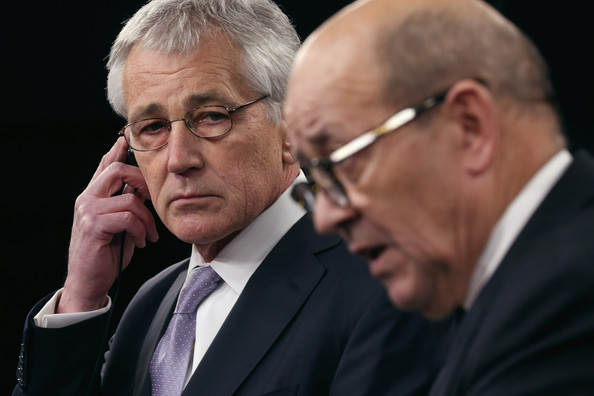US and French defense chiefs on Thursday discussed the possibility of France taking part in the American-led air war against the so-called ’Islamic State of Iraq and the Levant’ (ISIL) terrorist group in Syria.
 US and French defense chiefs on Thursday discussed the possibility of France taking part in the American-led air war against the so-called 'Islamic State of Iraq and the Levant' (ISIL) terrorist group in Syria, American Defense Secretary Chuck Hagel said.
US and French defense chiefs on Thursday discussed the possibility of France taking part in the American-led air war against the so-called 'Islamic State of Iraq and the Levant' (ISIL) terrorist group in Syria, American Defense Secretary Chuck Hagel said.
"Yes, we did discuss possibilities of France's involvement in Syria," Hagel said at a joint news conference in Washington.
However, his French counterpart, Jean-Yves Le Drian, would not confirm or deny that the subject came up during his talks at the Pentagon.
France is one of five European countries that have committed aircraft to the campaign in Iraq but none of them are involved in the US-led air attacks on ISIL in neighboring Syria. Five Arab countries are participating in the American-led bombing raids there.
France is among the western countries that provided weapons to the Syrian opposition forces fighting against the national government, the forces from which ISIL and Al-Qaeda-affiliate Al-Nusra Front terrorist groups have been emerged.
Le Drian said France was participating in air strikes against ISIL in Iraq because Baghdad had made a formal request under the UN charter.
"France is there because of that request. And we are in the coalition because of that request," he said, suggesting that Paris had not ruled out an eventual role in the Syria campaign.
Echoing warnings from President Barack Obama and top commanders, Hagel said the fight against the militants would deliver no easy victories.
Asked about the timeline for training Iraqi forces, Hagel said he didn't know how long it will take.
Both Hagel and Le Drian welcomed a vote by Turkey's parliament approving military action against the IS group.
Turkey has often proposed creating a "buffer zone" along its border with Syria to protect civilians and stem the flow of refugees.
Hagel, however, said the US government was not currently considering carving out a buffer zone in northern Syria, but remained open to discussing various "options" with the Turkish government.
The US military's top officer, General Martin Dempsey, has said a safe zone would require round-the-clock air patrols and a substantial ground force to enforce it.